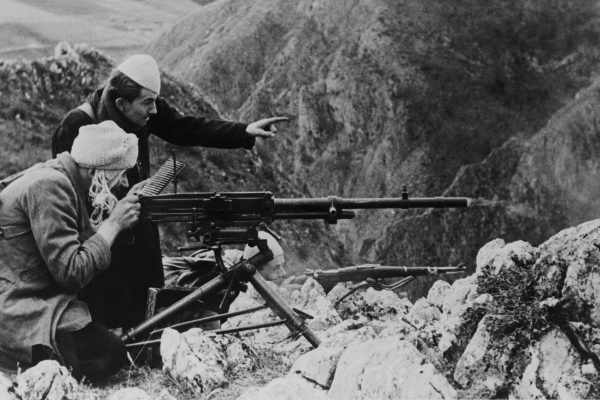This controversial map poses a stark security risk further stigmatising and endangering 800,000 Muslims who live in Austria. It’s an insensitive tactic, especially after the deadly terrorist attack on Tewhid Mosque in Vienna last November, which killed 4 innocent people.
Islamophobic Attacks Increase After Austrian Government Publishes Dangerous ‘National Map of Islam’
This controversial map poses a stark security risk further stigmatising and endangering 800,000 Muslims who live in Austria. It’s an insensitive tactic, especially after the deadly terrorist attack on Tewhid Mosque in Vienna last November, which killed 4 innocent people.
The Austrian government published an interactive map identifying the locations of 623 mosques and Islamic associations around the country last month. It also includes the names of individual officials from each mosque.
Vienna’s Al Hidaya Mosque came under attack after the map was published online. A spokesperson explained, “Since the launch of the so called ‘Islam Map’, several other mosques, including ours were targeted by neo-fascist groups. The community feels threatened that this announcement by the Government has given the green light to far-right racists to target religious institutions.”
There have also been signs put up around Austria warning people of nearby mosques with the image of an ‘angry Muslim man’ accompanied with a warning stating “Beware! Political Islam nearby.”
Ümit Vural, president of the Islamic Religious Community in Austria (IGGO), has said that Islamophobic and racist attacks have increased dramatically:
Attacks against Muslims rose after this incident. Ugly signs were hung on our mosques…We had said that this website must be taken offline as soon as possible – that it could be dangerous.”
Chancellor Sebastian Kurz’s government is formed by a coalition of the conservative Austrian People’s Party (ÖVP) and the Greens Party. The Greens Party spokeswoman for integration, Faika El-Nagashi, stated: “No Green minister or MP was involved or even told about it. The project mixes Muslims with Islamists and is contrary to what integration policy should look like.”
However, Austrian Integration Minister Susanne Raab has defended the controversial map, stating: “This is by no means a general suspicion of Muslims. It’s about the common struggle against political Islam as a breeding ground for extremism.”
Vural has also stated that, “We see very clearly that Muslims are treated differently. If we’re an officially recognized religion here, we want the same treatment as the other 15 faith communities, we don’t want different or special treatment.”
The map was compiled in collaboration with the University of Vienna and the Documentation Centre of Political Islam.
Dr Ednan Aslan, head of the ‘Islam map’ project at The University of Vienna, has said that the map “doesn’t show political Islam, but the diversity of Islam in Austria”. However, the map has been used by the Austrian government to create suspicion, despite many of the mosques not having any links to religiously motivated extremism – also known as ‘political Islam’. The University of Vienna has now demanded that its logo be removed from the project.
Cardinal Christoph Schoenborn, the head of the Austrian Catholic Church, wrote an opinion editorial on Friday 4th June stating that it was “dangerous to give the impression that one of the religious community is under general suspicion” and he also asked why Islam was singled out.
Many organisations are urging the Austrian government to withdraw the dangerous map including the Council of Europe, which said in a statement: “Publication of the map is hostile to Muslims and potentially counterproductive.”
Austria's gov't publishes a map of all mosques, ostensibly to fight "political Islam," even though it may invite Islamophobic attacks. Will it publish a map of all churches backing "political Christianity"? The ruling People's Party is Christian democrat. https://t.co/iHeOjF1wAn pic.twitter.com/qERPSI404M
— Kenneth Roth (@KenRoth) May 31, 2021
On 29th May, The Muslim Youth of Austria (MJOE) said it planned to file a lawsuit against the government of Chancellor Sebastian Kurz. The website with the original map has been taken down [as of June 9th, 2021] but the map is still available online via other host websites.
The Green Party has said there will be a review before the site goes back online. The website currently states: ‘’Due to the heated atmosphere of the last few days, the IT operator of the platform has changed. It is only a brief interruption that was necessary due to current developments. As soon as this has been done, the project will go back online.’
This controversial map poses a stark security risk further stigmatising and endangering 800,000 Muslims who live in Austria. It’s an insensitive tactic, especially after the deadly terrorist attack on Tewhid Mosque in Vienna last November, which killed 4 innocent people.
Mosques are consistently under attack leaving Muslims in vulnerable and life-threatening situations so governments should be doing all they can to protect every citizen, regardless of their faith. If Austria wants to tackle extremism it needs to take the initiative to work closely with the Muslim community and stop vilifying them as security threats.





